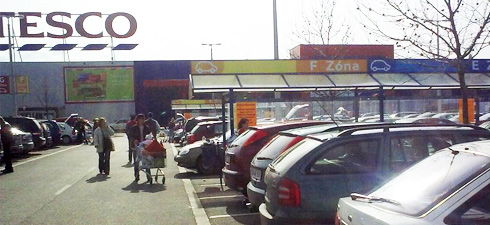For many years, the Hungarian spa town of Mosonmagyaróvár derived most of its income from Austrian tourists who came from nearby Vienna to take the waters and visit cheap dentists. But in recent months, Mosonmagyaróvár has acquired another attraction, a Tesco superstore on the outskirts of the town.
New customers are arriving in droves. On Friday afternoon, the carpark in front of Tesco is jammed with cars registered in Bratislava, which is only 20 kilometres away. There are people speaking Slovak everywhere. Inside the store, families slowly tour the aisles. Every few moments, they stop and feverishly convert the prices from forints to euros, and then heap yet more merchandise into their already overloaded shopping trolleys. All the products, and these include one-off purchases like televisions and shoes, and everyday items like butter, cheese, wine, and washing powder… in a word, everything, is about 20% cheaper than it would be across the border in Slovakia. And the Hungarian checkout girls are happy to oblige, “Of course, you can pay in euros.”
It is a phenomenon that is repeated all along Slovakia’s borders: in Hungary, Poland, and even in the Czech Republic. For Slovakian shoppers, the advantage is clear: while prices in their own country have remained stable since the adoption of the Euro, depreciation of the Polish zloty, the Hungarian forint and the Czech crown has made most products much cheaper in neighbouring states. But the situation could have been radically different.
There’s no doubt that the opening of borders, and the fact that the majority of Slovaks live in border regions has contributed to the enormous wave of shopping tourism. Public opinion polls have shown that Slovakian consumers are increasingly satisfied with the euro, but it is an enthusiasm that is not shared by Slovakian retailers who, in the first quarter of this year, saw their profits fall by 7%.
Slovakian superstores were aware of this customer drain-off to rivals across the border, but they were initially slow to respond. However, now that the loss of business has reached critical proportions, they have decided to launch a price war, and have introduced drastic cuts, in some cases of up to 10%, mainly on basic food items. At the same time, they are running newspaper advertising campaigns comparing their prices with those of competitors in neighbouring countries.
One possible solution to the problem of shopping tourism would be to lower VAT on food (with only a few exceptions, Slovakia charges a standard rate of 19% on almost all items), but Prime Minister Fico has refused to consider this option, insisting that the government cannot afford a further loss in tax revenues, which have already been diminished by the current economic crisis (during the first four months of this year, tax revenues shrank by 12% compared with the same period in 2008, and VAT revenue fell by one third).
Comments in the media suggesting that Slovakia is suffering from a particularly severe economic crisis, which is in part due to an overvaluation of the Slovakian crown (30,126 Sk for one euro) when the euro was adopted, have resulted in heated debate. The vice governor of the National Bank of Slovakia, Martin Barto, pointed out that the majority of products bought by consumers who crossed the border were imported from elsewhere, and this implied that the difference in prices caused a variation in local conditions for large-scale retailers. He further asserted that Slovakian consumers were voting with their feet, because Slovakia does not have enough medium-sized stores, which are better able to manage flexible pricing schemes. In conclusion, he announced that cross-border shopping is a symptom of a larger problem in the Slovakian economy, which is almost entirely based on large-scale car and steel manufacture, and suffers from a dearth of medium-sized companies.
It’s completely possible that the adoption of the euro is not solely responsible for cross-border differences in consumer prices. When retailers adjust their prices, the strength of the local currency is not the only consideration, they also take into account the buying power of the average consumer. According to a survey by the market research agency GfK, buying power in Slovakia has risen by 20%, and Slovakian consumers are significantly better off than their neighbours in Hungary and Poland, and almost on a par with consumers in the Czech Republic.
But if that is the case, how do we explain the fact that in Austria, which is another euro-zone country where buying power is three times higher than it is in Slovakia, prices are often identical and in many cases lower? A significant difference in the behaviour of Austria’s consumers might provide the answer. Outside the Billa superstore in the small Austrian town of Hainburg, which is only about 15 kilometres from Bratislava, we found another car park full of cars with Bratislava number plates, just like the one in Mosonmagyaróvár.
At the beginning of May, our major retailers proudly announced that their price cuts were bringing consumers back to Slovakia. If that is true, then the euro is certainly not to blame for all this cross-border shopping.
Was this article useful? If so we are delighted!
It is freely available because we believe that the right to free and independent information is essential for democracy. But this right is not guaranteed forever, and independence comes at a cost. We need your support in order to continue publishing independent, multilingual news for all Europeans.
Discover our subscription offers and their exclusive benefits and become a member of our community now!












